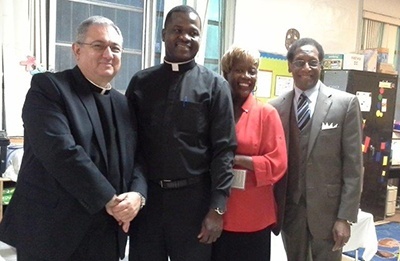
Catholic schools: Living the vision
Monday, August 25, 2014
*Kim Pryzbylski
What is a vision statement? According to the dictionary, it is foresight, what things should become in the future. An educational vision statement describes a shared image of what the Catholic school aspires to be, typically expressed in terms of success in the eyes of parents and students or others whose approval can affect our destiny.
The Office of Catholic Schools’ vision statement is: Catholic school personnel model the integration of current cutting-edge technology and learning strategies into instruction in order to prepare students to be stewards of our Catholic faith as well as global leaders, emphasizing student engagement and customer centeredness.
One way to share how this vision has come to life is through stories. Our Catholic schools will be sharing their stories. The following illustrate just a few successes in the four standards of excellent Catholic schools: Catholic Identity, Governance/Leadership, Academic Excellence and Operational Vitality.
Catholic Identity
The Catholic community has always provided service to its own members as well as the community at large. Service is an integral part of stewardship. At one high school, the business class took an active role in a coffee project in Haiti. The coffee project was created to help both the people and environment in Haiti. The students began by learning about Haiti's history, economic sustainability and fair trade and Catholic social justice. They then learned about the types and quality of coffee beans, sorted the raw Haitian beans and took a field trip to a local coffee roaster. Students created a marketing plan for the final product and a sales strategy to sell the coffee in the United States. Because of this joint effort, the farmers are able to create a market for their coffee and provide for their families. The students learned the value lesson that “if you teach a person how to fish, he can feed a village.”
Governance/Leadership
The purpose of a board is to increase awareness of the school not only among parents, but also among parishioners and the greater community. At one elementary school, the establishment of a consultative board automatically changed the morale of the school because parents felt that there was a group with authority willing to listen to their opinions and suggestions, and make recommendations to the administration. Without any doubt, the establishment of a consultative board eradicated the constant, negative atmosphere and harmful propaganda associated with the school. Because of the diversity of the members, the board was able to increase awareness of the school not only among parents, but also among parishioners and the greater community.
Academic Excellence
In the area of technology, the Archdiocese of Miami has been successful in implementing a one-to-one device program at each archdiocesan high school. The students use the technology as a tool for learning. One school is providing each student with an individualized learning plan. The students, with assistance from a team of teachers, complete the plan and advance to the next level. Through a caring and nurturing learning environment, each student is guided towards learning autonomy with the objective of developing 21st century thinkers and doers. Students are respected for their differences so their potential is explored at its maximum, enabling them to be successful both academically and in their lives.
At the elementary level, a school has established differentiated learning literacy centers. They provide the opportunity for a hands-on approach to learning in small groups at various levels. Parents and even grandparents assist the students in the centers, allowing for a more interactive and challenging experience. A laptop center and, this year, a tablet center, add the element of technology for the very young students in kindergarten through third grade. The plan for the 2014-15 school year is to incorporate the differentiated learning centers in math.
Operational Vitality

Photographer: COURTESY PHOTO
Pictured here with Father Wayne Carroll Paysse, far left, during his May visit to South Florida are Msgr. Chanel Jeanty, vicar general and pastor of St. Philip Neri Parish, Katrinia Reeves-Jackman, director of the Office of Black Catholic Ministry in the archdiocese, and Donnie Edwards, associate superintendent of schools and chair of the education committee of the Office of Black Catholic Ministry.
Catholic schools do make a difference. You can make a difference by keeping all school communities in your prayers and sharing the wonderful stories.

